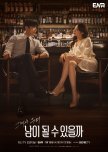This review may contain spoilers
A wasted premise
[UPDATED] As a Jang Seung-jo fan, I was desperate for "Strangers Again" to work. I ignored all the misfires and the lapses in logic and stayed with it until the 12th episode. But when the ending rolled in, I realized that there was a basic flaw in the character development of the leads.
I don't mind flawed characters. I especially love flawed characters who grow stronger in the broken places. The male lead started out well enough as a divorced divorce lawyer whose life is a mess. His ex-wife is also a divorce lawyer who seems to have come out feistier and richer. All the ironies were in place.
But no, after laying a solid foundation for what could have been a smart commentary on life, love and career, "Strangers Again" proceeds to self-destruct.
Jang Seung-jo's Eun-beom is so badly drawn, I suspect he was written as a plot device for Ha-ra's journey. His characterization is utterly illogical: a formidable intellect in court, he doesn't make sense in everyday life. He loves Ha-ra but concocts a hare-brained scheme to break-up his marriage, sets up his ex with his best friend so he stops paying alimony, never told her about his childhood traumas while she was his wife, and turns out to be a serial relationship killer. His redemption is a short footnote in the last episode via a Google search and a trip to the therapist's office. The writer was not interested in his evolution – only the havoc he creates.
Kang So-ra's character Ha-ra is better fleshed-out and is obviously the real center of the series: she may be cut-throat in court but she's not unscrupulous, she genuinely wants to help her clients, and in turn learns life's valuable lessons from them. She not only gets the best lines in terms of self-discovery, she also gets the best meltdowns.
The second leads' story trajectory is hands down the better romance in this series. From irritating characters, the liberated noona and the political conservative blossom into relatable characters as they learn to own up to their mistakes, communicate, and compromise.
Hyperrealism is no excuse for bad storytelling. I want characters with depth whose motivations are well-established. I want a plot that makes sense, even if it is imitating life.
Law practice, love, and divorce are potent ingredients that could've given us an unforgettable series – that's the wasted premise. I was expecting a Matryoshka doll with layers of meanings. Instead I got Barbie and Ken in power suits who are trapped in their own drama.
I don't mind flawed characters. I especially love flawed characters who grow stronger in the broken places. The male lead started out well enough as a divorced divorce lawyer whose life is a mess. His ex-wife is also a divorce lawyer who seems to have come out feistier and richer. All the ironies were in place.
But no, after laying a solid foundation for what could have been a smart commentary on life, love and career, "Strangers Again" proceeds to self-destruct.
Jang Seung-jo's Eun-beom is so badly drawn, I suspect he was written as a plot device for Ha-ra's journey. His characterization is utterly illogical: a formidable intellect in court, he doesn't make sense in everyday life. He loves Ha-ra but concocts a hare-brained scheme to break-up his marriage, sets up his ex with his best friend so he stops paying alimony, never told her about his childhood traumas while she was his wife, and turns out to be a serial relationship killer. His redemption is a short footnote in the last episode via a Google search and a trip to the therapist's office. The writer was not interested in his evolution – only the havoc he creates.
Kang So-ra's character Ha-ra is better fleshed-out and is obviously the real center of the series: she may be cut-throat in court but she's not unscrupulous, she genuinely wants to help her clients, and in turn learns life's valuable lessons from them. She not only gets the best lines in terms of self-discovery, she also gets the best meltdowns.
The second leads' story trajectory is hands down the better romance in this series. From irritating characters, the liberated noona and the political conservative blossom into relatable characters as they learn to own up to their mistakes, communicate, and compromise.
Hyperrealism is no excuse for bad storytelling. I want characters with depth whose motivations are well-established. I want a plot that makes sense, even if it is imitating life.
Law practice, love, and divorce are potent ingredients that could've given us an unforgettable series – that's the wasted premise. I was expecting a Matryoshka doll with layers of meanings. Instead I got Barbie and Ken in power suits who are trapped in their own drama.
Was this review helpful to you?



